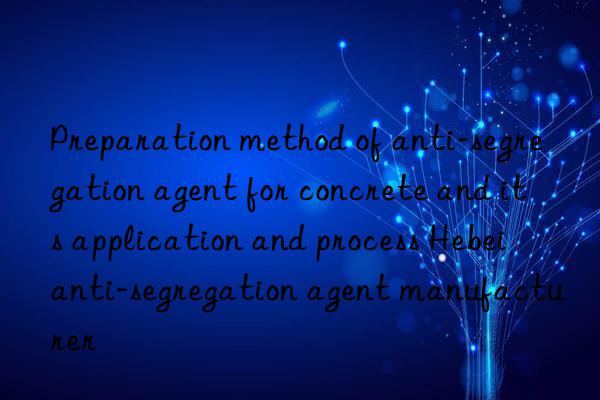
1. This technology relates to the technical field of concrete admixtures, to an anti-segregation agent for concrete, and specifically to a preparation method and application of an anti-segregation agent for concrete.
Background technology:
2. With the rapid development of our society, the urbanization process The pace of development is accelerating, and the demand and requirements for commercial concrete continue to increase. In actual projects, the cohesion between the components of the concrete mixture is often insufficient and it is difficult to resist the sinking of the coarse aggregate, resulting in the segregation phenomenon of mutual separation of the components of the concrete mixture and uneven internal composition and structure, which can be serious. Affecting its construction quality, such as the occurrence of cracks or cracks, reduced concrete strength, poor pumping performance, and reduced economic benefits. Therefore, it is necessary to formulate appropriate technical formulas to solve the problem of concrete segregation to ensure the construction quality of concrete.
Technical implementation elements:
3. The purpose of this technology is to solve the above-mentioned concrete segregation and stratification To solve the problem of improving the strength of concrete, after experimental research by this technician, an anti-segregation agent for concrete is provided.
4. Specifically, the anti-segregation agent for concrete provided by this technology has a raw material composition of: fly ash 5 to 15 parts by mass. parts, 5 to 15 parts of mineral powder, 1 to 2 parts of brazing fiber, 1 to 2 parts of iron ore powder, 1 to 2 parts of polyglycerol, 20 to 30 parts of polyhydroxyacid water-reducing agent, and 0.8 to 1.2 parts of tackifier. 0.5 to 0.9 parts of coagulant, 20 to 40 parts of deionized water.
5. Further, the polyhydroxyacid water-reducing agent is epoxy ethylene-epoxy propylene copolymer monomethyl ether (meth) acrylate, Used to solve the problem of poor tolerance of water reducing agents in concrete.
6. Further, the tackifier is used to improve the fluidity and smoothness of concrete. Cellulose or polyacrylic acid tackifiers are generally used. The agent is preferably one of hydroxymethylhydroxyethylcellulose, methylcellulose and sodium polypropylene sulfonate.
7. Further, the coagulant is used to increase the dry shrinkage of concrete and reduce the elastic modulus and adhesion of concrete. Preferably, Choose one of calcium fluoroaluminate, sodium carbonate, and calcium aluminate.
8. This technology provides the preparation method of the epoxyethylene-epoxypropylene copolymer monomethyl ether (meth)acrylate, and the specific steps As follows: add 10 to 14 parts of ethylene oxide-propylene oxide copolymer monomethyl ether into the reaction kettle, melt it into a liquid at 60°C; heat it up to 90°C to 95°C, and then add 20 to 24 parts of acrylic acid, methane Add one of the acrylic acids and 12 to 20 parts of hydroquinone to the reaction kettle, and raise the temperature to 115°C to 125°C; then slowly add 1 to 5 parts of concentrated sulfuric acid to the bottom of the reaction kettle, and keep it warm for 5 hours at 120 to 125°C. ~10h, epoxyethylene-epoxypropylene copolymer monomethyl ether (meth)acrylate was prepared.
9. This technology also provides a method for preparing an anti-segregation agent for concrete, which is prepared according to the following steps: at 25°C to 40°C, First add the fly ash, mineral powder, steel fiber, and iron ore in the raw materials to the concrete mixer and stir for 5 to 20 minutes, then add polyglycerol, polyhydroxyacid water-reducing agent, tackifier, and coagulant Stir with deionized water and raise the temperature to 60°C to 75°C, keep it warm for 2h to 4h, and finally neutralize it with an alkaline solution to a pH of 7 to 8, and cool to room temperature to obtain an anti-segregation agent.
10. Further, the alkaline solution is a 10-20% naoh or koh solution.
11. In addition, this technology also provides the application of the above-mentioned anti-segregation agent for concrete in improving the performance of concrete. After
Experimental research by this technician shows that the anti-segregation agent can effectively prevent the phenomenon of segregation and delamination after concrete is mixed, and can improve the strength of concrete after solidification to a certain extent.
12. Compared with the existing technology, this technology has the following beneficial effects:
13. This technology provides a new type of anti-segregation agent for concrete, which has a simple preparation process, easy operation, safety and environmental protection. After in-depth research by those skilled in the art, the anti-segregation agent described in this technology is used for the preparation of concrete. The resulting concrete does not bleed or segregate and stratify after standing. No cracks or cracks occur after being left for 7 days. The strength complies with the "Concrete Quality Control Standards" and effectively solves the technical problem of segregation and delamination of concrete due to insufficient cohesion of each component.
<img src="/upfile/202304/2023041334528065.jpg"/
 微信扫一扫打赏
微信扫一扫打赏

